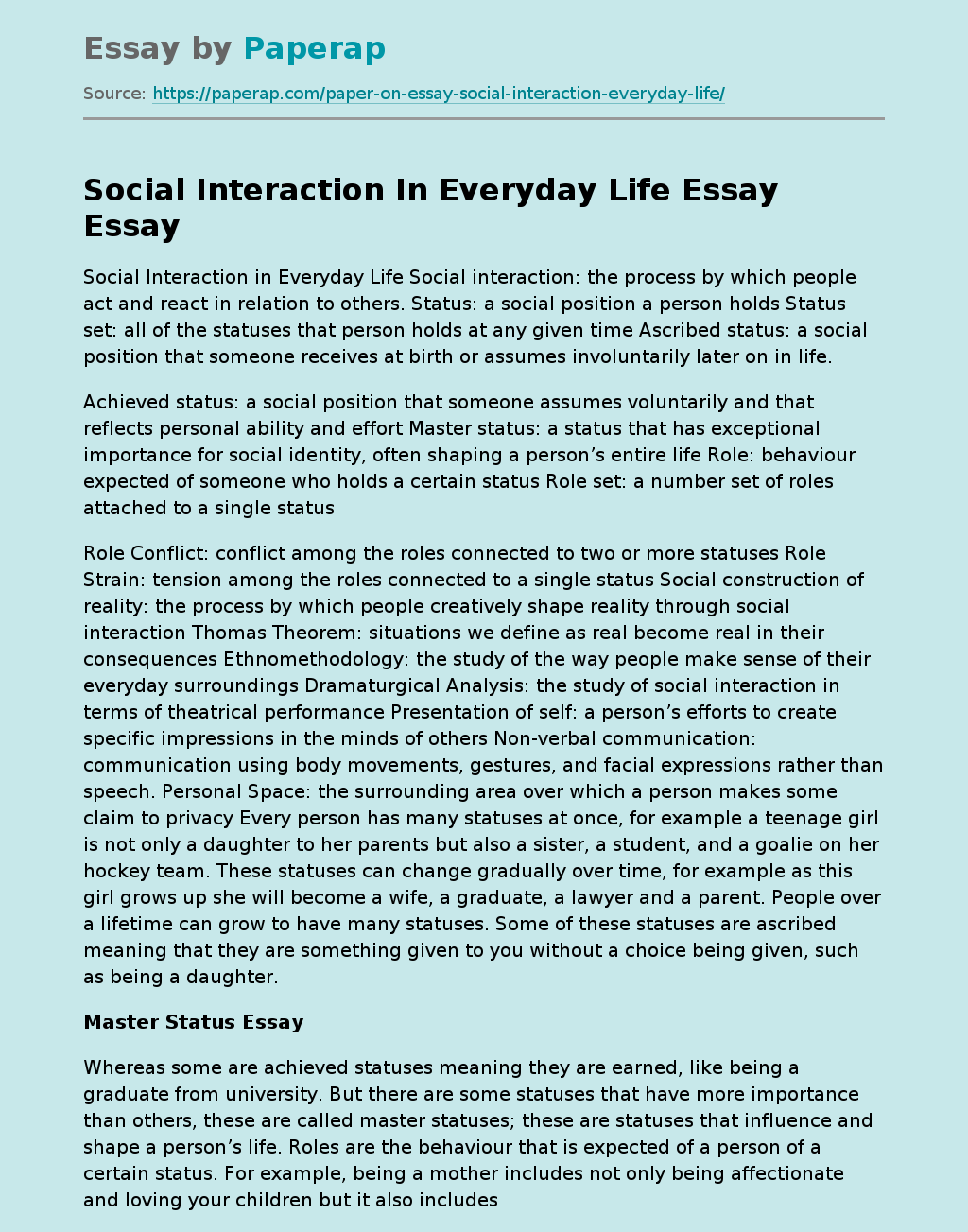Social Interaction In Everyday Life Essay
Social Interaction in Everyday Life Social interaction: the process by which people act and react in relation to others. Status: a social position a person holds Status set: all of the statuses that person holds at any given time Ascribed status: a social position that someone receives at birth or assumes involuntarily later on in life.
Achieved status: a social position that someone assumes voluntarily and that reflects personal ability and effort Master status: a status that has exceptional importance for social identity, often shaping a person’s entire life Role: behaviour expected of someone who holds a certain status Role set: a number set of roles attached to a single status
Role Conflict: conflict among the roles connected to two or more statuses Role Strain: tension among the roles connected to a single status Social construction of reality: the process by which people creatively shape reality through social interaction Thomas Theorem: situations we define as real become real in their consequences Ethnomethodology: the study of the way people make sense of their everyday surroundings Dramaturgical Analysis: the study of social interaction in terms of theatrical performance Presentation of self: a person’s efforts to create specific impressions in the minds of others Non-verbal communication: communication using body movements, gestures, and facial expressions rather than speech.
Personal Space: the surrounding area over which a person makes some claim to privacy Every person has many statuses at once, for example a teenage girl is not only a daughter to her parents but also a sister, a student, and a goalie on her hockey team.
These statuses can change gradually over time, for example as this girl grows up she will become a wife, a graduate, a lawyer and a parent. People over a lifetime can grow to have many statuses. Some of these statuses are ascribed meaning that they are something given to you without a choice being given, such as being a daughter.
Master Status Essay
Whereas some are achieved statuses meaning they are earned, like being a graduate from university. But there are some statuses that have more importance than others, these are called master statuses; these are statuses that influence and shape a person’s life. Roles are the behaviour that is expected of a person of a certain status. For example, being a mother includes not only being affectionate and loving your children but it also includes giving discipline and structure to the child’s life. These roles can be different due to circumstances and cultures. When a person who has a status, they also have a role set, which is a set of different roles that are linked to one status.
At times, there are issues with people’s roles; there are times when roles can cause problems between multiple statuses, the term for that is called role conflict. Role strain is when there are issues between the roles of one status. People can “exit” roles as well, as people grow the can change their roles and create new ones. Dramaturgical analysis, created by Erving Goffman, is an analogy in which we are viewed like directors or viewers watching a play of everyday life. Each person’s performance is a performance of oneself. Non-verbal communication (NVC) is when people communicate with talking. Some examples would be like smiling and winking. Eye contact is another element of NVC, such as people lying, they tend to look away.
Emotions are extremely important to people’s lives. There are six basic emotions: sadness, happiness, anger, fear, disgust and surprise. Emotions are guided not only by a biological basis, but also by cultural differences as well. Culture can determine the “trigger” for emotion. Culture is also a determinant of whether you decided whether a certain event is something sad or something happy. Culture not only is a determinant but it also regulates the value of emotion and whether it is proper to show emotion in public. Language is a crucial key to social interaction; it’s what allows us to communicate basic needs and the deeper meanings to things.
Social Interaction In Everyday Life Essay. (2019, Dec 05). Retrieved from https://paperap.com/paper-on-essay-social-interaction-everyday-life/

